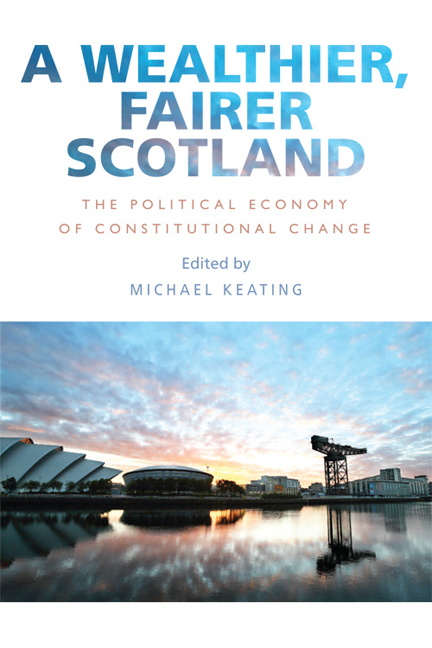Book contents
- Frontmatter
- Contents
- List of Figures
- List of Tables
- List of Contributors
- Preface
- 1 The Political Economy of Devolution
- 2 Taxes and Spending
- 3 Inequality in Scotland: Dimensions and Policy Responses
- 4 Towards a Fairer Scotland? Assessing the Prospects and Implications of Social Security Devolution
- 5 A More Gender-Equal Scotland? Childcare Policy in Scotland after the Independence Referendum
- 6 Constitutional Change, Social Investment and Prevention Policy in Scotland
- 7 Getting to a Wealthier and Fairer Scotland
- References
- Index
5 - A More Gender-Equal Scotland? Childcare Policy in Scotland after the Independence Referendum
Published online by Cambridge University Press: 22 December 2017
- Frontmatter
- Contents
- List of Figures
- List of Tables
- List of Contributors
- Preface
- 1 The Political Economy of Devolution
- 2 Taxes and Spending
- 3 Inequality in Scotland: Dimensions and Policy Responses
- 4 Towards a Fairer Scotland? Assessing the Prospects and Implications of Social Security Devolution
- 5 A More Gender-Equal Scotland? Childcare Policy in Scotland after the Independence Referendum
- 6 Constitutional Change, Social Investment and Prevention Policy in Scotland
- 7 Getting to a Wealthier and Fairer Scotland
- References
- Index
Summary
Introduction
During the independence referendum campaign, childcare policy became a key and salient issue in the debate. The Scottish Government (2013) used its White Paper on Scottish independence to argue the case that childcare policy would improve under independence and would be part of an overall strategy to grow the Scottish economy. What was largely missing from the debate was how childcare could become part of a wider infrastructure investment to help foster a more gender-equal society in Scotland. Childcare provision has been a devolved competence since 1999, but the devolution of the income tax bands and rates opens up the potential for additional capacity in childcare to provide for an increase in the number of hours worked by parents, mostly mothers. Although childcare in Scotland does differ from childcare provision elsewhere in the UK in some important respects, the mixed model approach with a predominance of the private sector is common to both Scotland and the rest of the UK. Funding of childcare is predominantly ‘demand side’, meaning that parents are subsidised through the social security system rather than the bulk of investment going into providing the services themselves.
During the independence referendum, the Scottish Government's (2013) White Paper outlined that, in an independent Scotland, a more ‘Nordic’, supply-side approach would be adopted in order to boost maternal employment levels and thus generate higher income tax yields. Scotland voted No to independence, but the Scottish Government has remained committed to investing in childcare services. Much of the Scottish Government's arguments around childcare during the referendum centred on the notion that any increase in revenues generated as a result of increased provision would not accrue to Scotland. However, near full devolution of income tax is imminent and there now exists an incentive for the Scottish Government to reform Scotland's childcare system towards a supply-side model.
The purpose of this chapter is twofold. First, an overview of the literature on childcare policy presents a picture of which policy routes are best suited for the promotion of a more gender equal society. Second, the chapter outlines the opportunities and constraints that now exist following the devolution of further powers to Scotland for the furthering of gender equality.
- Type
- Chapter
- Information
- A Wealthier, Fairer ScotlandThe Political Economy of Constitutional Change, pp. 94 - 109Publisher: Edinburgh University PressPrint publication year: 2017



